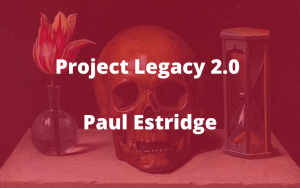Written by David Seibel | 11.14.19
This post is the fourth in Project Legacy, a series of interviews that aim to learn from leaders outside of education to influence those inside education. You can read previous contributions from Jake Stamper (Business), Jeff Worrell (Politics), and Steve Poe (Ministry) on our blog.
The following post recounts lessons from an entrepreneur and salesman that can’t seem to retire. With 45 years in hardware and metal-forming sales, Tony Van Hoozer has a few experiences to share that impact education today.
A manager is an overseer. A leader has to inspire.
The first insight I learned from Tony was the difference between a manager and a leader. Tony has worked with a wide variety of people and is more than qualified to offer his perspective on this topic. When contrasting management with leadership, he said, “A leader paints the vision and also tries to stay current based upon changes. Overall, their job is to be consistent with the mission and help others to do the same. A manager makes sure that everything is in its place and nobody is leaving before 5 o’clock. A manager is an overseer. A leader has to inspire.”
At first, this didn’t seem related to education, but then I reviewed Marcus Buckingham’s book on management entitled First Break All the Rules: What the World’s Greatest Managers Do Differently. I asked myself: should teachers see themselves as managers of their students or as leaders? Buckingham says that managers “are all about people. Their job is to align team strengths with the needs of the organization, to care for people, to show them he or she has their career in mind, to give them direction and resources, and to cover their back. Managers are individualizers.”
On the other hand, leaders “are all about vision. They have an ability to visualize a better future so clearly, and they are so passionate about it, they can’t help but do everything they can to make that future a reality. Their vision and passion make people follow them independently of their position in the organization.” When you compare the skills of a leader to those of a manager, they are different. It is not as if management skills turn into leadership skills. Instead, this is an apple to orange comparison. One of these focuses on the horizon while the other focuses on the team.“
Teachers must possess both an engaging vision to draw students toward a better future and also the insight to identify the unique potential of each student. Interestingly, Tony’s most remembered teacher is the one who told him he would never amount to anything. While some students need to be encouraged and comforted, others just need a firm kick in the pants.
People are willing to invest more of themselves into something they see as valuable.
The second point Tony shared was the need to hustle. He recounted how his first job out of college taught him to offer excellent customer service to clients. “My commitment to customer service began at my first job. At the hardware company, it was about maximizing margin to gain a profit. We kept a high value because we would find it hard to get hardware items and get them to the customer in a timely way. In fact, we charged as much of a price that the market could bear, but our clients would pay because we fulfilled our promise. We offered products that others didn’t, and that’s why our customers kept coming back and even depended upon us. This is where I also learned to hustle on the phone.”
People are willing to invest more of themselves into something they see as valuable. This is true both in running a hardware company and in managing a highly effective classroom. Students put time and energy into class, and they need to see that the juice is worth the squeeze. At Tony’s first job, he learned how to hustle on the phone because he knew what benefits his customers would enjoy that his competition could not provide. I think that teachers could stand to be better salesmen and think of their lesson plans as a persuasive pitch. The competition is stiff in today’s market for the attention of students’ hearts and minds, and we cannot afford not to hustle.
In education, the bottom line is students learning and loving the true, good, and beautiful.
The third lesson that I gleaned from Tony is that retirement is a cultural creation. Not only his Tony still managing a warehouse and a sales region in Indiana, but he is also one of the most energetic grandparents I have ever met. He is deeply invested in their lives and regularly takes them to ball games, museums, and out flying drones. Tony shared that he loves taking advantage of the opportunities that life throws at him. He is not ready to spend all day at a golf course or on the back porch but wants to continue to overcome obstacles and achieve.
One thing that is inspiring about Tony is his desire to see results. Like any good businessman, he wants to see a return on his investment. Mere activity does not stop his fire. Rather, it is evidence of progress towards meaningful results. In education, the bottom line is students learning and loving the true, good, and beautiful. Although learning is difficult to measure and goes far beyond tests, many educators could focus more on the results their students are producing. I see far too many folks in the education world that confuse mere activity with a lack of genuine progress. Educators are not called to busy themselves with classroom activities for a time of their lives and then retire to other activities. Instead, they are called to leave a lasting mark upon each student that lasts long after they are gone.
President and Owner of ADFS, Tony Van Hoozer has 45 years of expertise in hardware and metal forming sales, marketing, and application engineering. Tony is a former President, Owner, and VP of Sales & Marketing for several other distribution and manufacturing companies. Tony’s success is the result of meeting customer’s needs, exceeding their expectations of service and precision.

As Head of School at Coram Deo Academy, Dave Seibel aims to cultivate a generation of scholar-disciples who are passionate about learning. He is husband to Brooke and father of four future Coram Deo students. He is a graduate of Wabash College, Marian University and in final Master of Divinity course at Southern Seminary.
RSVP for an Open House





